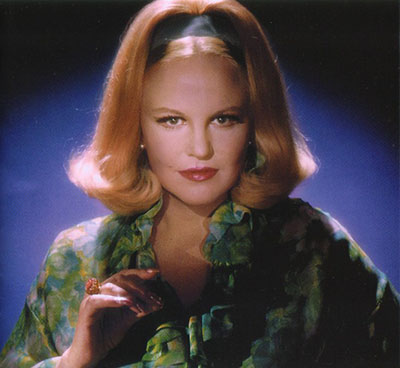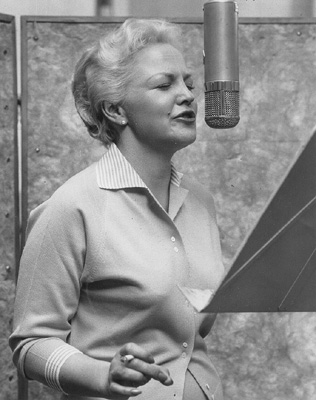|
MISS PEGGY LEE PCC's Vintage Interview With the Iconic Pop/Jazz Singer
By Paul Freeman [1992 Interview] Norma Deloris Egstrom's career spanned 1941 to 2000. From radio to big bands to television and movies, the woman known professionally as Peggy Lee mesmerized listeners. Let's tell it like it is -- when she sang, Miss Peggy Lee gave us fever. She treated us right. Singing with Benny Goodman's band, she cut the popular record "Why Don't You Do Right?" A distinctive, sensual song stylist, Lee went on to have huge hits with such numbers as "Mañana," "Fever," "Black Coffee," "Lover" and "Mister Wonderful." Her comeback sensation, "Is That All There Is?" earned her the Best Contemporary Vocal Performance Grammy in 1969. The versatile Lee was also a talented actress. She received an Oscar nomination for Best Actress in a Supporting Role for her work as a boozing singer in Jack Webb's 1955 movie, "Pete Kelley's Blues." She was a successful, prolific songwriter, as well. Lee wrote 1947's "Mañana"with her then husband Dave Barbour, who had also been a member of Goodman's group. With Sonny Burke, she co-wrote clever numbers for Disney's "Lady and the Tramp" -- "He's a Tramp" and "The Siamese Cat Song." She also provided several character voices for the animated feature. Her other accomplishments as a lyricist included the theme from the cult western "Johnny Guitar," music by Victor Young. We had the privilege of interviewing Lee in 1991. She passed in 2002 at age 81. Induction into the Songwriters Hall of Fame and a Grammy Lifetime Achievement Award were among many honors bestowed upon her over the years.
When it comes to female vocalists, there has never been one classier or more captivating than Miss Peggy Lee. Though she has struggled through health problems in recent years, this trouper still sings magnificently. "Fever" and "Is That All There Is" still sound fresh and exciting. Lee completed an engagement in New York a few weeks ago. Featuring album cuts her fans have requested over the years, she drew rave reviews. Among those in attendance were such fans as Liza Minnelli, k.d. lang and Madonna. Lee was impressed by Madonna. "I found her to be a charming person. She expressed interest in playing me in the movie of my life. I'm surprised at how much we have in common. She had a very sad childhood. I know that my work is a little more conservative," Lee says with a laugh. "That's diplomatically put. "I really have a sense of responsibility about what I sing. I won't sing anything raunchy. I want to leave the stage proud of what I did, not ashamed of anything." Without slipping into the offensive, Lee could caress a song, using meltingly sexy tones. The appeal of her blend of pop and jazz extends far beyond nostalgia. "At the New York shows, I had a tremendous number of fans in their 20s. I've had them before, but not in those great numbers. I get a lot of fan mail from that age group, too. They have discovered my kind of music. For a while, they were hearing just rock. They didn't hear our music at all. Now they're hearing it and loving it. Many movies, like 'When Harry Met Sally,' are using it now. Natalie Cole's big success with 'Unforgettable' was also a help." The youngest of seven children, Lee, whose mother died when she was five, found that music helped her to weather emotional turmoil. Her early influences included Count Basie, jazz vocalist Maxine Sullivan and blues legend Bessie Smith. She made her singing debut at age 14. After high school graduation, she snared a radio gig, but the program director suggested she change her name, which, until that moment, had been Norma Egstrom. "He said it just didn't fit. I agreed. He looked at me for a while and said, 'You look like a Peggy!' Then he got some other gentlemen in there and they tried a few last names -- Lynn, Lane and, finally, they settled on Lee."
For two years, she toured with Benny Goodman's big band. "When I joined, I went to the vocal coach. I took one lesson and went to work that night. Benny said, 'Are you taking lessons?' I said, 'Yes,' really proud of his noticing. He said, 'Well, stop it right now! That's not what I hired. I like your natural voice!' "Some study is good in anything, but, even in painting or any other art form, if you take from the natural, instinctive side of yourself, you'll get more originality." In 1943, Lee married guitarist David Barbour and left Goodman to raise a family. Her husband prodded her to try recording as a solo artist. A string of hits followed. The record-buying public was enthralled by her sultry interpretations. Soon the "Miss" became attached to her name. "That was Nick Castle's idea. He used to do my choreography and helped to shape an act. He said, 'You should use Miss, because it will make people stop and take notice.' It's true. There's a rhythm to it that catches your ear." Lee has also proven to be a gifted composer. She wrote hit tunes for many movies. The numbers she co-wrote for the animated classic "Lady and the Tramp" were vital to the endearing quality of the film. When Disney raked in a fortune from video cassette sales, she sued to get a fair share of the profits. "I won, but they didn't pay me. It's been terrible, in and out of courts. The cross-appeal is coming up. Let's hope it will finally be taken care of." The issue involves more than money, she says. "Its high time we -- as artists -- stood up for ourselves and for each other." It's ironic that Miss Lee is the one who has displayed the courage to stand up to the big corporation. Standing altogether has been a challenge. For six months last year, she was paralyzed by an inflammation of the nerves, muscles and bones. Doctors prescribed steroids for her condition. "It stopped the paralysis, but it had a bad side effect. It blew my face and body up. I'm working to get that down. When I'm through with the steroids, I'll be myself again. In the meantime, I'm doing all right. I make adjustments. It doesn't bother my performing at all." The book "The Science of Mind," which was given to her by the author, Ernest Holmes, has helped her, as have books about Far Eastern philosophy. "They teach you about going within yourself, speaking to the divine within yourself and asking for whatever you need. Ask and you shall receive. I've done a lot of asking and a lot of receiving. I'm very grateful." Lee has found that humor can be a healing element in her life, as can her contact with audiences. "If you're telling a story and somebody's really interested, it wakes up all the cells. People tell me how my songs helped them through dark periods. That is extremely gratifying. It's my basic reason for living, my little contribution to the hope and happiness of people." |


